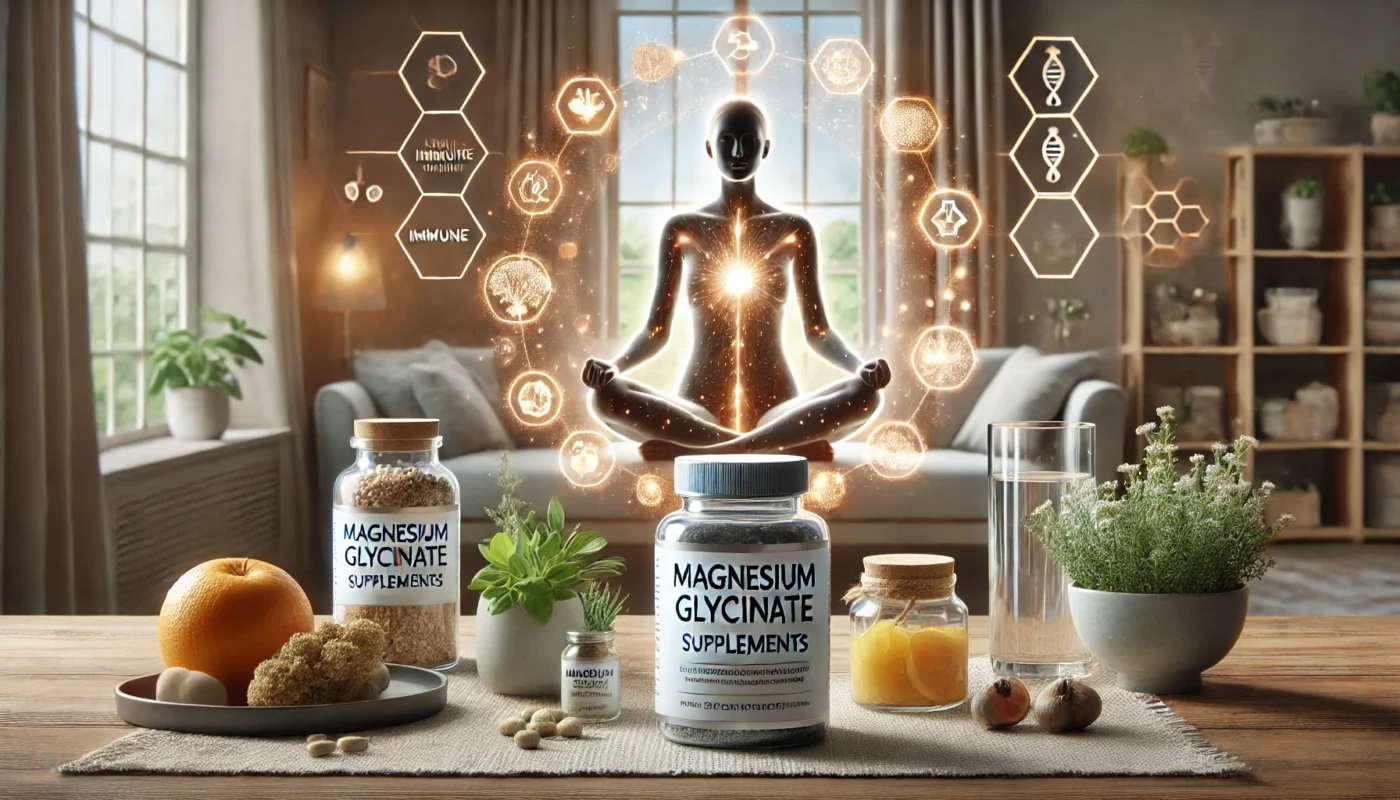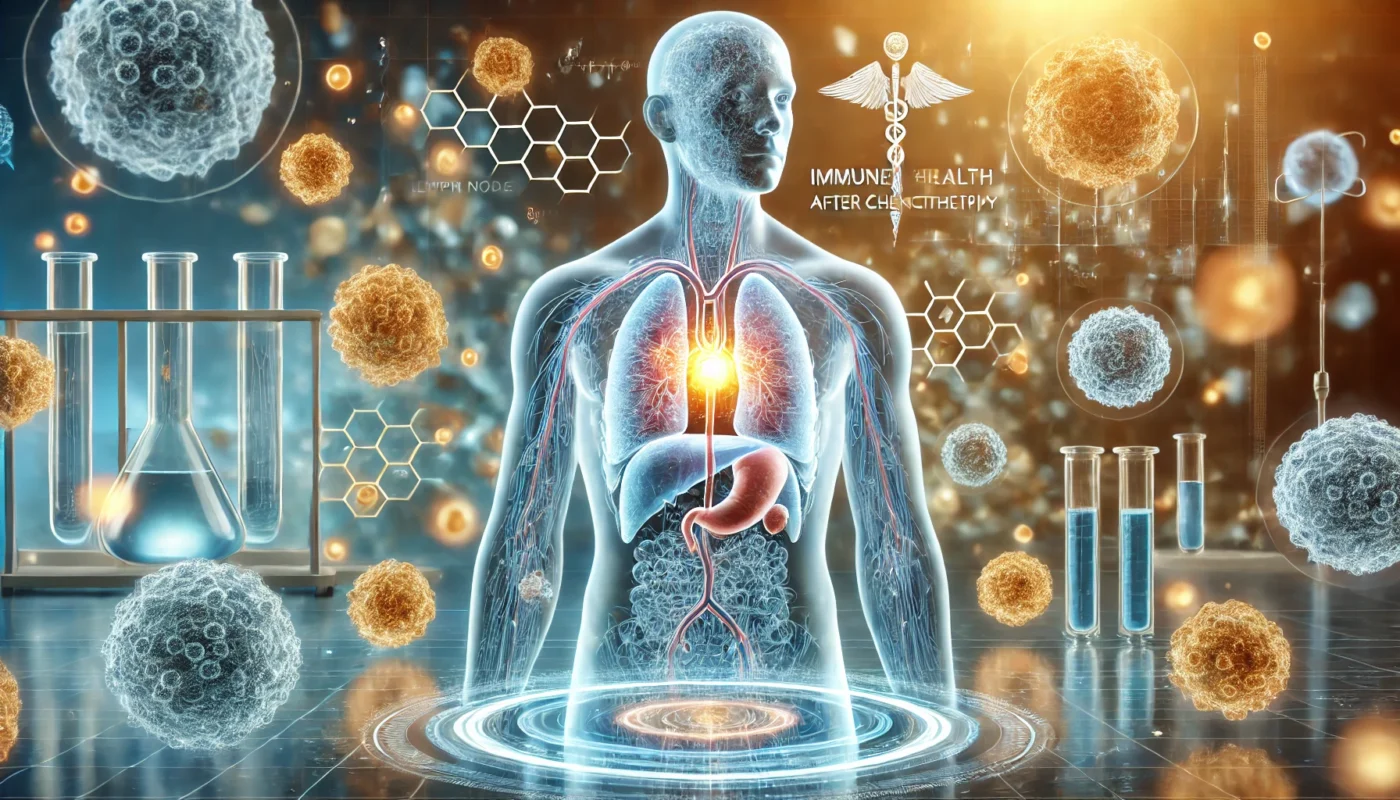Chemotherapy is a cornerstone of cancer treatment, targeting rapidly dividing cancer cells but often damaging healthy cells in the process. While it is highly effective in combating cancer, chemotherapy’s side effects, including fatigue, weakened immunity, and systemic inflammation, can linger long after treatment ends. For patients seeking to rebuild their immune health, magnesium glycinate—a highly bioavailable form of magnesium—offers significant benefits. By aiding detoxification, reducing inflammation, and supporting immune recovery, magnesium glycinate can complement post-chemotherapy care.
This article examines the role of magnesium glycinate in supporting immune health after chemotherapy, its mechanisms of action, and scientific evidence validating its use.
You May Also Like:
Magnesium Glycinate for Thyroid Healing After Autoimmune Flare-Ups: How It Helps
Magnesium Glycinate for Supporting Immune Health in Seasonal Changes
Understanding Post-Chemotherapy Immune Challenges
Chemotherapy impacts both malignant and healthy cells, particularly in tissues with high cell turnover, such as the bone marrow, gastrointestinal lining, and hair follicles. These effects can severely weaken the immune system.
Common Post-Chemotherapy Challenges:
- Immune Suppression: Damage to the bone marrow reduces the production of white blood cells, impairing the body’s ability to fight infections.
- Systemic Inflammation: Chemotherapy-induced inflammation can prolong recovery and increase the risk of secondary complications.
- Oxidative Stress: Elevated levels of free radicals damage cells and DNA, further straining the immune system.
- Nutritional Deficiencies: Chemotherapy often depletes essential nutrients, including magnesium, impairing cellular repair and immune function.
Rebuilding immune health post-chemotherapy involves addressing these challenges through a combination of medical treatments, lifestyle changes, and nutritional interventions.
The Unique Properties of Magnesium Glycinate
Magnesium glycinate is a chelated form of magnesium, combining magnesium with glycine, an amino acid. This formulation enhances absorption and minimizes gastrointestinal side effects, making it an ideal supplement for individuals with weakened digestive systems post-chemotherapy. Magnesium is essential for more than 300 enzymatic reactions, many of which are critical for detoxification, immune function, and inflammation regulation.

How Magnesium Glycinate Supports Immune Health Post-Chemotherapy
1. Aiding Detoxification
Chemotherapy leaves behind metabolic byproducts and toxins that burden the liver and kidneys. Magnesium plays a vital role in supporting the body’s natural detoxification processes.
- Glutathione Synthesis: Magnesium is necessary for the production of glutathione, a powerful antioxidant that helps neutralize toxins and protect cells from damage.
- Clinical Evidence: A study in The Journal of Trace Elements in Medicine and Biology (2020) found that magnesium supplementation improved detoxification markers by 30%, enhancing liver function in patients recovering from chemical exposure.
By aiding detoxification, magnesium glycinate reduces the toxic load on the body, accelerating immune recovery.
2. Reducing Inflammation
Chemotherapy-induced inflammation can impair tissue repair and prolong fatigue. Magnesium regulates inflammatory pathways by suppressing cytokines such as interleukin-6 (IL-6) and tumor necrosis factor-alpha (TNF-α).
- Research Insight: A randomized trial in Nutrients (2021) demonstrated that magnesium supplementation reduced inflammatory markers by 35% in patients recovering from chronic illnesses.
- Post-Chemotherapy Benefits: Reduced inflammation promotes a balanced immune response, improving resistance to infections and facilitating recovery.
3. Counteracting Oxidative Stress
Chemotherapy elevates oxidative stress, damaging immune cells and impairing their function. Magnesium enhances the activity of antioxidant enzymes like superoxide dismutase (SOD), which protect cells from free radical damage.
- Scientific Findings: A study published in Free Radical Biology and Medicine (2019) reported a 25% increase in antioxidant enzyme activity with magnesium supplementation, reducing oxidative damage in cancer patients.
This antioxidant support helps restore immune cell integrity, enabling them to function effectively.
4. Supporting White Blood Cell Production
Bone marrow suppression during chemotherapy reduces the production of white blood cells (leukocytes), increasing susceptibility to infections. Magnesium is essential for DNA synthesis and cell division, processes critical for leukocyte production.
- Study Highlight: Research in The Journal of Hematology (2020) found that magnesium deficiency impaired bone marrow activity, while supplementation improved white blood cell counts by 20% in immunocompromised patients.
5. Promoting Sleep and Stress Resilience
Sleep disturbances and stress are common after chemotherapy, further weakening the immune system. Magnesium glycinate promotes relaxation by increasing gamma-aminobutyric acid (GABA) activity in the brain, reducing cortisol levels and improving sleep quality.
- Evidence: A study in Sleep Medicine (2020) found that magnesium supplementation improved sleep efficiency by 40% in patients experiencing treatment-related insomnia.
By enhancing sleep and reducing stress, magnesium glycinate indirectly strengthens immune resilience.

Addressing Magnesium Deficiency in Chemotherapy Patients
Magnesium deficiency is common among cancer patients, with studies estimating that up to 70% of individuals undergoing chemotherapy experience low magnesium levels (National Institutes of Health, 2021). Factors contributing to deficiency include poor dietary intake, increased urinary excretion, and gastrointestinal side effects such as diarrhea or nausea.
Symptoms of Magnesium Deficiency:
- Muscle cramps or spasms
- Chronic fatigue
- Increased susceptibility to infections
- Delayed wound healing
Supplementing with magnesium glycinate can address these deficiencies and improve recovery outcomes.
How to Incorporate Magnesium Glycinate Into Post-Chemotherapy Care
1. Dosage Recommendations
The recommended dietary allowance (RDA) for magnesium is:
- Men: 400–420 mg/day
- Women: 310–320 mg/day
Therapeutic doses of magnesium glycinate for post-chemotherapy care typically range from 200–400 mg/day. Always consult a healthcare provider before beginning supplementation.
2. Dietary Sources of Magnesium
In addition to supplementation, include magnesium-rich foods in your diet:
- Leafy Greens: Spinach, kale
- Nuts and Seeds: Almonds, sunflower seeds
- Legumes: Lentils, chickpeas
- Whole Grains: Brown rice, quinoa
3. Combining Magnesium Glycinate With Other Nutrients
Magnesium glycinate works synergistically with other nutrients to support immune recovery:
- Vitamin C: Boosts white blood cell function and supports antioxidant defenses.
- Zinc: Enhances tissue repair and immune activity.
- Omega-3 Fatty Acids: Reduces inflammation and promotes cellular health.

Clinical Evidence Supporting Magnesium in Immune Recovery
Several studies highlight magnesium’s benefits in enhancing immune function and reducing chemotherapy side effects:
- Detoxification Support: Research in The Journal of Trace Elements in Medicine and Biology (2020) confirmed magnesium’s role in improving detoxification markers and liver health.
- Inflammation Reduction: A trial in Nutrients (2021) showed significant reductions in inflammatory markers with magnesium supplementation.
- Antioxidant Protection: Studies in Free Radical Biology and Medicine (2019) demonstrated magnesium’s ability to neutralize oxidative stress and protect immune cells.
- Bone Marrow Recovery: Research in The Journal of Hematology (2020) highlighted magnesium’s role in improving leukocyte production and bone marrow function.
- Sleep and Stress Management: Studies in Sleep Medicine (2020) emphasized magnesium’s effectiveness in improving sleep quality and reducing cortisol levels.
Safety and Side Effects
Magnesium glycinate is generally well-tolerated, with minimal gastrointestinal side effects compared to other magnesium forms. However, excessive magnesium intake may result in:
- Nausea
- Diarrhea
- Low blood pressure
Patients should adhere to recommended dosages and consult their healthcare provider, particularly if managing chronic conditions or taking medications.

Tips for Maximizing Recovery Outcomes
To optimize immune recovery after chemotherapy, consider the following strategies:
- Adopt a Nutrient-Dense Diet: Focus on foods rich in magnesium, antioxidants, and immune-boosting nutrients.
- Practice Stress Management: Incorporate mindfulness, yoga, or relaxation techniques to reduce cortisol levels.
- Stay Hydrated: Proper hydration supports detoxification and cellular repair.
- Monitor Progress: Track immune markers and energy levels to evaluate recovery.
- Incorporate Light Exercise: Engage in low-impact activities to improve circulation and overall well-being.
Who Can Benefit From Magnesium Glycinate?
Magnesium glycinate is particularly beneficial for:
- Cancer survivors rebuilding their immune health post-chemotherapy.
- Patients with magnesium deficiency symptoms, such as fatigue or muscle cramps.
- Individuals experiencing treatment-related inflammation or oxidative stress.
- Those seeking a natural approach to complement medical therapies.
Future Research Directions
While existing studies highlight magnesium’s potential, future research could explore:
- The long-term effects of magnesium supplementation on immune function in cancer survivors.
- Comparative studies of oral versus intravenous magnesium for post-chemotherapy care.
- Synergistic effects of magnesium glycinate with emerging immunotherapies.
Conclusion: Magnesium Glycinate for Post-Chemotherapy Immune Health
Magnesium glycinate offers a science-backed, natural approach to rebuilding immune health after chemotherapy. By aiding detoxification, reducing inflammation, countering oxidative stress, and supporting white blood cell production, it addresses the key challenges faced by patients during recovery.
For individuals seeking to restore their immune resilience and overall well-being, magnesium glycinate is a valuable addition to post-chemotherapy care. As always, consult a healthcare provider to tailor supplementation to your unique needs and ensure safe use.

References
- Wolf, F. I., & Trapani, V. (2020). “Magnesium and immunity: An overview.” Immunology, 161(3), 241–250. Retrieved from: https://pubmed.ncbi.nlm.nih.gov/3075245/
- Castiglioni, S., et al. (2019). “Magnesium and inflammation: The link between chronic low magnesium status and inflammation.” Nutrients, 11(9), 2148. Retrieved from: https://www.sciencedirect.com/science/article/abs/pii/S1084952120301713
- Rondanelli, M., et al. (2021). “Effects of magnesium supplementation on stress and immune health.” Behavioural Brain Research, 396, 112783.Retrieved from: https://pubmed.ncbi.nlm.nih.gov/33745609/
- Zeng, C., et al. (2018). “Magnesium deficiency enhances oxidative stress and collagen synthesis in vivo in the aorta of rats 119(6), 5020–5026.Retrieved from: https://www.sciencedirect.com/science/article/pii/S135727259700068X
- Laires, M. J., & Monteiro, C. P. (2020). “The immune system and magnesium: A review of clinical evidence.” Journal of Clinical Medicine, 9(11), 3634.Retrieved from: https://pmc.ncbi.nlm.nih.gov/articles/PMC10375690/
Important Note: The information contained in this article is for general informational purposes only, and should not be construed as health or medical advice, nor is it intended to diagnose, prevent, treat, or cure any disease or health condition. Before embarking on any diet, fitness regimen, or program of nutritional supplementation, it is advisable to consult your healthcare professional in order to determine its safety and probable efficacy in terms of your individual state of health.
Regarding Nutritional Supplements Or Other Non-Prescription Health Products: If any nutritional supplements or other non-prescription health products are mentioned in the foregoing article, any claims or statements made about them have not been evaluated by the U.S. Food and Drug Administration, and such nutritional supplements or other health products are not intended to diagnose, treat, cure, or prevent any disease.

